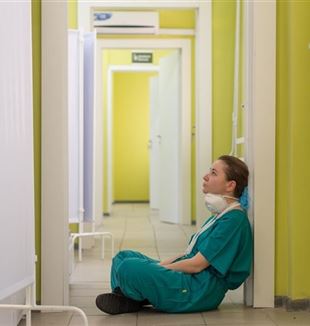
"That whisper that sweeps cynicism away"
In the last few months, recent medical school graduates have found themselves catapulted into the hospital in the midst of a state of emergency. What have they seen and experienced? Some of them have told us, like Melisa, a first-year graduate resident.Motionless in bed, respirator attached. Melisa, shrouded in Covid protection, approaches Giovanni, thinking, "I am going towards a guy who is dying, there is nothing left to do." She checks the IV, takes his hand, and he unexpectedly squeezes it tightly and opens his eyes. "Against my resigned thinking, he was telling me he was there. It was one of the moments when hope was reborn, that is, seeing that this man was loved and saved by Another. His value was more than his clinical parameters."
When the emergency broke out in March, Melisa, a first-year intensive care resident, found herself catapulted into the intensive care unit of a hospital for Covid patients in Brianza. In the frenzy of those days, where she had to learn on the ground what she would then study in the free hours of her day, there were moments like that, whispers that made her live. One morning, an anaesthetist she works with, the most gruff and grumpy, said to her, "You are always like that." "Like what?" she asked him. "So sincere," was his dry reply.
"They are 'people and moments of people,' as Fr. Giussani says, presences that have imposed themselves and opened me, on days when physical exhaustion and resignation, sometimes cynicism, seemed to take over."
Since September, Melisa has been in ‘clean’ intensive care, Covid free. One day she had to see a young man who had just had a second stroke. She struggled to look at him thinking about the serious consequences the disease will bring. A female doctor entered and exclaimed, "Hello, Giorgio!" The man stopped crying, opened his eyes and laboriously stuttered, "Hello." "Calling him by his name, as if he were a dear friend, she had loved him. That was worth more than my skepticism." That is what hope is all about: feeling loved.
The end of November. Faced with a very complex situation, the surgeon, called urgently, said to his patient: "The only thing you can do now is pray, a lot!” The woman was astonished: "But I have never prayed." Melisa was there on the side. Everyone was silent. The head physician approached: "You do not need any ability to pray, you just need to have the desire to.” For Melisa this was a tipping point. "I was going to say, I will pray for her. But that doctor affirmed something much more important: she was a daughter of God even though she had denied it all her life, so she could ask the Father. She was loved as a daughter."#Coronavirus